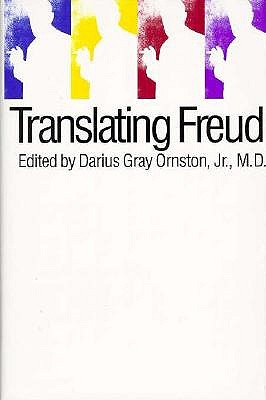

 Yale University Press
Yale University Press
Translating Freud


Key Metrics
- Darius Ornston
- Yale University Press
- Hardcover
- 9780300054545
- 9.55 X 6.4 X 1.07 inches
- 1.2 pounds
- Psychology > General
- English
 Secure Transaction
Secure TransactionBook Description
The authors discuss the divergencies between what Freud said about his own ideas and what his most popular translators have presented as his words, considering difficulties and solutions devised for the most widely accepted translations (including the British Standard Edition). They also explain why there is no historical and critical edition of Freud's works in any language--including German. This book includes an English version of part of Traduire Freud, the explanatory volume for the first comprehensive French edition of Freud's works, now in progress. In this landmark essay, the French editors detail the issues they faced in undertaking to translate Freud, the choices they made, and the reasoning behind them.
Translating Freud not only analyzes the specific problems of rendering Freud's writings in another language but also illuminates the task of translation in general, emphasizing the importance of the tradition, experience, beliefs, and national origin of the translators and their audiences.
Author Bio
Darius Ornston is Associate Professor at the Munk School of Global Affairs & Public Policy at the University of Toronto where he specializes in the politics of cooperation and change. An expert in Nordic innovation policy, his first book, When Small States Make Big Leaps, illustrates how those communities use cooperation to enter new, high-technology markets. In Good Governance Gone Bad, he demonstrates how the same, tight-knit networks which accelerate reform and restructuring can lead to policy overshooting, overinvestment, and economic crisis.
Since moving to Canada, his research has focused on Canadian cities, including their resilience to anchor firm collapse and the role of storytelling as a form of collective action. His research on the causes and consequences of cooperation has been published by Comparative Political Studies, Comparative Politics, Economic Geography, the European Bank for Reconstruction and Development, Governance, the OECD, Review of Policy Research, the University of Michigan Press, and West European Politics.
With Dan Breznitz, Professor Ornston is also working on the design of innovation agencies and strategies to encourage risk-taking and experimentation in the public sector. Their research on radically innovative developmental agencies has appeared in Comparative Political Studies, Industrial & Corporate Change, and Socio-Economic Review.
As part of the Munk School’s Master of Global Affairs program, Professor Ornston teaches one section of “Global Innovation Policy” as well as three second-year seminars. In “The Political Economy of the Welfare State” students develop strategies for reforming big, slow-moving, highly politicized institutions. “The Political Economy of Trade” focuses on the ways smaller states circumvent the constraints associated with the global trading system. “Innovation and the City” examines the tools fiscally constrained local policymakers can use to shape innovation and regional economic development.
Source: University of Toronto Munk School
Videos


Community reviews
Write a ReviewNo Community reviews